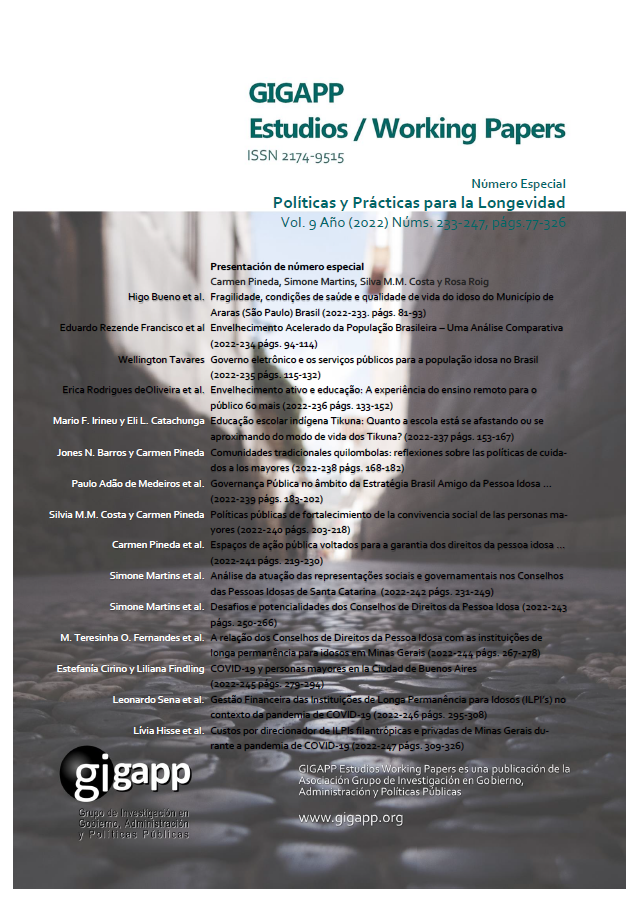Educação e Preparação para Aposentadoria
Grupos de Professores Universitários (Brasil e Portugal)
Abstract
This article describes the process of two groups of retirement preparation, carried out with university professors. The interventions took place in Portugal and Brazil, in 2020 and 2021 respectively, with Professors from the University of Coimbra and the Universidade Federal Fluminense. The methodology used in the intervention is guided by Shultz's theory of group development (Shultz, 1974). A retirement preparation program aims to promote a dialogue that leads to reflections on the new phase of life, seeking to deconstruct the idea of the impossibility of new life projects. The initial proposal was adapted to the remote work modality as a consequence of the pandemic moment. The evaluation of this experience shows that the main objective was achieved since it contributed to the participants reflecting on retirement, awakening or reviving interests, and carrying out new projects, deconstructing the idea of post-retirement inactivity.
Downloads
References
Baltes, P. B. e Willis, S. L.. 1982. “Plasticity and enhancement of intellectual functioning in old age. Penn State’s Adult Development and Enrichment Project (ADEPT)”, em F. I. M. Craik e S. Trehulo, ed., Aging and cognitive processes. New York: Plenum Press.
Duarte, C. M. e Mello-Silva, L. L. 2009. “Expectativas diante da aposentadoria: um estudo de acompanha-mento em momento de transição”, Revista Brasileira de Orientação Profissional, 10: 45-54.
Fonseca, A.G. 2019. “Programas de Preparação para Aposentadoria: Programas efetivos nas Universidade Federais de Ensino Superior”. Dissertação de Mestrado Profissional em Administração Publica em Rede Nacional - PROFIAP da Universidade Tecnológica Federal do Paraná.
Herdy, J.S., Leider, A.C., e Aragão, J.S. 2011. “Aposentadoria: Um novo olhar diferenciado para um novo momento de vida”, em Verthein, M.A.R., Braga, M.P., e Vergne, C.M., orgs., Multifaces das Práticas em Psicologia do Trabalho: impasses e criação. Niterói:EdUFF.
Herdy, J. S. e Silva, T. A. B. 2015. “A contribuição intergeracional do projeto “Um Novo Olhar sobre a Apo-sentadoria” para o aposentado e o estudante”, Revista Extensão, 9:95 - 108.
Herdy, J. S. 2018. “Envelhecer e aposentar: contribuições de um programa de preparação para aposenta-doria (PPA)”. Anais II Congresso Nacional de Envelhecimento Humano, Campina Grande.
Herdy, J.S. 2018b. “Estudio acerca del impacto del proceso de jubilación en profesores universitários: expectativas y estrés”. Tese de Doutorado. Universidad del Salvador, Buenos Aires, Argentia.
Herdy, J.S. 2019. “Preparação para a Aposentadoria: o que pensam professores universitários”, em Porte-la, K.C.A e Schumacher, A.J., org., Produção Científica e experiências Exitosas, Ponta Grossa:Ed Atena.
Instituto Nacional de Estatística. 2015. “Anuário Estatístico de Portugal 2014”, Retirado do website do Instituto Nacional de Estatística: https://www.ine.pt/.
Lyubomirsky, Sheldon, Schkade. 2005. “Pursuing Happiness: The Architecture of Sustainable Change”, Review of General Psychology, 9:111–131
McAdams, D. P. 2015. The art and science of personality development, New York: Guilford Press.
World Health Organization. 2006. World health statistics.
Murta, S., Oliveira, S., França, C., Pedralho, M., Seidi, J., Lira, N., Carvalhedo, R.K.M., Conceição, A.C., e Gunther, I. 2014. “A preparação para aposentadoria: implementação e avaliação do Programa Viva Mais!”, Psicologia: Reflexão e Crítica, 27:1-9.
Neto, Arthur. 2010. “Da vida laboral à reforma: expectativas de ocupação”. Tese de Doutoramento em Educação. Universidade Portucalense Infante D. Henrique. Porto.
Oliveira, C., Gonçalves, S. e Lopes, M. 2021. A preparação para a reforma nas organizações em portugal. Como pensam os líderes?. Lisboa: SCSP-ULisboa.
Pereira, T.M.F.R.A. e Guedes, S.S. 2012. “Novo Tempo – A experiência de implantação do programa de preparação para pós-carreira na IFRN”, Holos, 28:158-177.
Pocinho, R., Belo, P., Silva, C., Navarro-Pardos, E. e Muñoz, J. F. 2017. “Bem-estar psicológico na reforma: a importância da preparação dos trabalhadores para a transição”, Revista Lusófona de Educação, 37:11-25.
Soares, D. H. P., Costa, A. B. C., Rosa, A. M. e Oliveira, M. L. S. 2007. “Aposenta-Ação. Programa de preparação para aposentadoria”, Estudos Interdisciplinares sobre Envelhecimento, 12:143 - 161.
Tarallo, R. S., Neri, A. L. e Cachioni, M. 2017. “Atitudes de idosos e de profissionais em relação a trocas intergeracionais”, Revista Brasileira de Geriatria e Gerontologia, 20:423 - 431.
Teiga, S. A. M. 2012. “As Relações Intergeracionais e as Sociedades Envelhecidas: Envelhecer numa so-ciedade não Stop – O Território Multigeracional de Lisboa Oriental”. (Tese de Mestrado, Escola Su-perior de Educação de Lisboa).
Zanelli, J.C., Silva, N., Tondera, N. 2013. “Orientação para aposentadoria e Gestão de Pessoas nas Organi-zações”, em Borges, L.O. e Mourão, L., org., O trabalho e as organizações: atuações a partir da Psi-cologia. Porto Alegre: Artmed..
Copyright (c) 2023 Janes Santos Herdy, Dra., Margarida Pedroso Lima, Ruth Luz Santos, Sara F Martins (Autor/a)

This work is licensed under a Creative Commons Attribution-NonCommercial-ShareAlike 4.0 International License.
Those authors who have publications with this journal, accept the following terms:
a. Authors will retain their copyrights and guarantee the journal the right of first publication of their work, which will be simultaneously subject to the Creative Commons Attribution-NonCommercial-ShareAlike 4.0 International (CC BY-NC-SA Recognition License). 4.0) that allows third parties to share the work as long as its author and its first publication are indicated in this journal.
Under this open access license, readers (users) can:
- Share — copy and redistribute the material in any medium or format
- Adapt — remix, transform, and build upon the material
Under the following terms:
-
Attribution — Users must give appropriate credit, provide a link to the license, and indicate if changes were made. You may do so in any reasonable manner, but not in any way that suggests the licensor endorses you or your use.
-
NonCommercial — Users may not use the material for commercial purposes.
-
ShareAlike — If remix, transform, or build upon the material, users must distribute your contributions under the same license as the original.
- No additional restrictions — Users may not apply legal terms or technological measures that legally restrict others from doing anything the license permits.
b. Authors may adopt other non-exclusive license agreements for the distribution of the version of the published work (eg: deposit it in an institutional telematic archive or publish it in a monographic volume) provided that the initial publication in this journal is indicated.
c. Authors are allowed and recommended to disseminate their work through the Internet (e.g. in institutional telematic files or on their website) before and during the submission process, which can lead to interesting exchanges and increase citations of the published work. (See The effects of open access).



